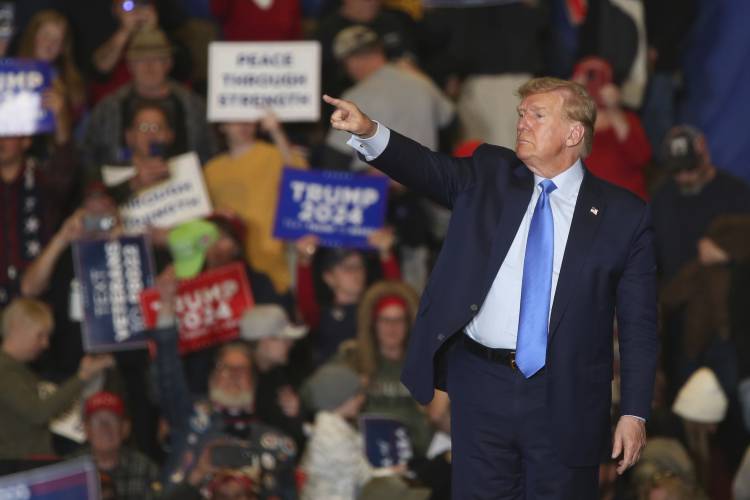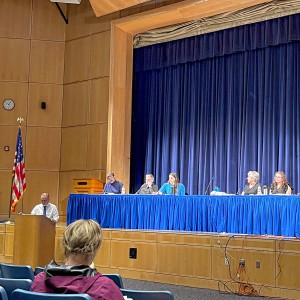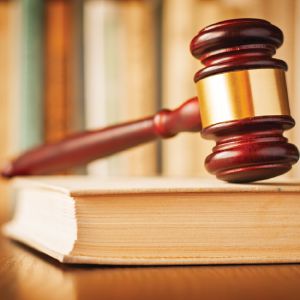Complaint challenges Trump’s ballot access in Massachusetts

Former President Donald Trump leaves the stage at a campaign rally in November in Claremont, New Hampshire. AP
| Published: 01-08-2024 6:07 PM |
After filing legal challenges in several other states to bar Donald Trump from ballot eligibility in this year’s primaries, a Massachusetts-incorporated advocacy group has now done so in its home state.
Free Speech for People, a nonprofit led by Amherst attorney John Bonifaz, together with former state attorney general candidate Shannon Liss-Riordan, filed an objection on Thursday to the State Ballot Law Commission saying that Donald Trump should be barred from the primary ballot based on Section 3 of the 14th Amendment, due to his role in the events of Jan. 6, 2021, when supporters of the former president stormed the Capitol building in an attempt to prevent the election of Joe Biden from being certified.
“[Trump] disseminated false allegations of fraud and challenged election results through baseless litigation. When his election lawsuits failed, he attempted unlawful schemes, including pressuring then-Vice President Mike Pence to discard electoral votes from states that had voted for President-elect Biden,” the objection reads. “Although Trump knew that these supporters were angry and that many were armed, Trump incited them to a violent insurrection and instructed them to march to the Capitol to ‘take back’ their country.”
Though Free Speech for People has attorneys and members across the country, it was originally incorporated in Massachusetts and remains led by Bonifaz, who helped found the organization 14 years ago in the wake of Citizens United v. FEC, a Supreme Court case that ruled that corporations and labor unions can make unlimited political expenditures.
“There is overwhelming evidence that Donald Trump engaged in an insurrection on Jan. 6, 2021 and is disqualified from holding public office,” Bonifaz said in an interview. “The State Ballot Law Commission can rely on prior rulings to issue its ruling disqualifying Trump from the ballot.”
Two states so far, Colorado and Maine, have already ruled that Trump is ineligible for the ballot, although the U.S. Supreme Court has agreed to hear an appeal to the case brought forward by Trump and will likely have final say on the matter. In addition to Massachusetts, Free Speech for People has also filed challenges in Oregon, Illinois, Minnesota and Michigan.
Though nominally a five-member body, the Massachusetts Ballot Law Commission is currently made up of three members and is chaired by Francis Crimmins, a retired judge and a Republican. The other two members, Joseph Eisenstadt and Joseph Boncore, are Democrats.
The official challenge submitted to the office of the Massachusetts Secretary of the Commonwealth lists five registered voters in the state of Massachusetts on whose behalf the challenge was submitted. They include former Boston Mayor Kim Janey and law professors Mark Brodin and Elizabeth Bartholet, who teach at Boston College and Harvard University, respectively.
Article continues after...
Yesterday's Most Read Articles
 Bridge of Flowers in Shelburne Falls to open on plant sale day, May 11
Bridge of Flowers in Shelburne Falls to open on plant sale day, May 11
 As I See It: Between Israel and Palestine: Which side should we be on, and why?
As I See It: Between Israel and Palestine: Which side should we be on, and why?
 $12.14M school budget draws discussion at Montague Town Meeting
$12.14M school budget draws discussion at Montague Town Meeting
 Greenfield homicide victim to be memorialized in Pittsfield
Greenfield homicide victim to be memorialized in Pittsfield
 Fogbuster Coffee Works, formerly Pierce Brothers, celebrating 30 years in business
Fogbuster Coffee Works, formerly Pierce Brothers, celebrating 30 years in business
 Streetlight decision comes to Shelburne Town Meeting
Streetlight decision comes to Shelburne Town Meeting
Secretary of the Commonwealth William Galvin declined to comment on the challenge, although he has made previous statements to the media on the matter, expressing belief that Trump would likely be deemed eligible.
“I think there’s been a lot of confusion between the ballot access issue and the issue of eligibility. The real issue presented by the 14th Amendment is eligibility to be president,” Galvin told reporters on Jan. 1, adding that he hoped to see a “decisive decision” from the U.S. Supreme Court on Trump’s eligibility.
The secretary said his office has heard from “a number of Democratic activists” recently on the topic, and he recalled telling some of them that Trump could still win the state Republican primary as a write-in candidate even if his name is not printed on ballots.
“I said, ‘What do you suggest I should do if people write him in?’ Well, they said, ‘Don’t count him.’ I said, ‘Are you serious?’ ... Elections and primaries are about voters. They’re not about candidates; they’re not about offices; they’re about voters. It’s the opportunity to make a decision the voters have,” Galvin said.
Bonifaz, who has previously run for the Secretary of the Commonwealth position, said he believed that Galvin should have already declined to list Trump on the ballot based on constitutional law.
“With respect to Secretary Galvin, he took an oath of office to defend the Constitution,” Bonifaz said. “He had a responsibility to enforce this provision of the Constitution just like any other. And his failure to do so is an abdication of his own oath that he took.”
Should the State Ballot Law Commission decide to ignore the objection and list Trump on the ballot, Bonifaz said they would appeal the case to the Massachusetts Supreme Court. He also said Free Speech for People would be filing an amicus brief for the U.S. Supreme Court case deciding Trump’s eligibility.
“There certainly is an urgency to this because there’s a March 5th primary and ballots are going to be sent overseas to voters soon,” Bonifaz said. “So I think the courts are going to know, as will the Ballot Law Commission, that they need to move expeditiously.”
Trump is among seven Republican candidates set to appear on the March 5 presidential primary ballot in Massachusetts. The order that the candidate names will appear on the ballot was determined during a drawing overseen by Galvin on Jan. 2.
On X, the Massachusetts Republican Party wrote that it “opposes this latest effort to remove Donald Trump from the ballot in Massachusetts through administrative fiat. We believe that disqualification of a presidential candidate through legal maneuverings sets a dangerous precedent for democracy. Democracy demands that voters be the ultimate arbiter on suitability for office.”
Alexander MacDougall can be reached at amacdougall@gazettenet.com.

 Community Legal Aid expands Disability Benefits Project to Franklin County
Community Legal Aid expands Disability Benefits Project to Franklin County Wear Orange organizers prepare display to remember gun violence victims
Wear Orange organizers prepare display to remember gun violence victims Deerfield candidates, Whately incumbent discuss issues with voters at South County Senior Center
Deerfield candidates, Whately incumbent discuss issues with voters at South County Senior Center
